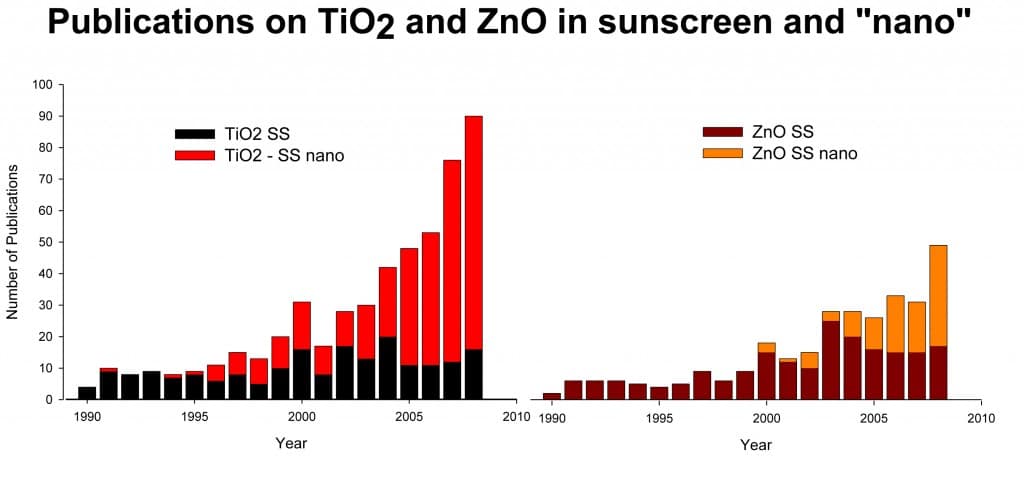Nano Zinc Oxide… Hundreds of Studies Show It’s Safe! Really!
By Bob Root, Keys Technologist
 One day when I was young, I was reading an issue of Popular Science Magazine with a story about a bold project to put man into space. I was so excited. Like many young people, I fantasized about flying in space. I became an avid follower of early rocket pioneers and awaited the day when the first manned rocket would launch.
One day when I was young, I was reading an issue of Popular Science Magazine with a story about a bold project to put man into space. I was so excited. Like many young people, I fantasized about flying in space. I became an avid follower of early rocket pioneers and awaited the day when the first manned rocket would launch.
A few months before the first test launch was to fire, my mother, in sheer terror, headed for church to join other devoted to pray for the salvation of mankind. When I asked her what it was about, she exclaimed that “the world will come to an end when that damned rocket punctures the sky.” …”We have to prepare by praying for our salvation.” This was a defining moment for me because I did not believe her fears or the need to pray for my salvation. I found this belief so curious and it probably set my life’s course in technology. I wondered how people could make stuff up and spin into a mass fear of destruction.
As I grew up, I went to school and entered the work world. My forte was technology. I never forgot the real look of terror on my mother’s face or the sound of fear in her voice. Every time I heard about some major cataclysm about to befall mankind, I thought of her and would wonder.
Throughout the late 70’s, 80’s and 90’s I spent most of my time developing and manufacturing data storage devices. Very high technology that was initially micro scale that quickly moved into the world of nanotechnology. My personal interests focused on medicine and medical devices because I believed in those science fiction movies that showed people shrinking down to micro and nano size to go into someone’s body to perform surgery from the inside. Well, not really shrinking people, but I believed that micro and even nano surgery was possible.
Yet another defining moment. I met my wife Wendy! Our meeting was so powerful that we wrote a book titled Defining Moments; A Brand New Day! Life was good. Then another defining moment, Melanoma. Surgically cured, Wendy then struggled with the chemical laden sunscreens that were a part of her everyday life. At a moment of frustrations, we took her off of every prescription skin cream and sunscreens to search for a cleaner alternative.
Much of our story is elsewhere on our website and in this blog, but how we started was the beginning of Keys.
Before ever dreaming of Keys, I became involved with some technology projects conducted at the National Cancer Institute’s by a man named Dr. Mauro Ferrari. We became friends and colleagues. Mauro believed that medicine could target single cancer cells in the body using nano-scale devices to deliver a single nanopharmacology to “hot” cancer cells while leaving healthy cells alone. He has done it and his work continues today as Professor and Director of The Division of NanoMedicine and Deputy Chairman of The University of Texas Department of Biomedical Engineering
Back to Keys! We self-funded this new company and created some strong rules. Safety first, healthy healing second and constant research third. Wendy said one day, “If we are going to do this, (start Keys) I want us to make the safest and best everyday sunscreen in the world!” That became my challenge and I turned to many old friends and many new friends for help. Solar Rx was born as a clean, green vegan sun protection product that used nano zinc oxide because it was the safest and highest performing broad spectrum sun protection known to man. With access to national labs, university research and some plain ancient aboriginal medicine, Solar Rx quickly became known as one of the highest rated most effective sunblocks in the world. (Consumer Reports July 2007 Sunscreen Report) It was also ranked as the safest moisturizer sunscreen by the EWG Sunscreen Report in 2008, 2009 & 2010). All in the face of this unsubstantiated nano controversy.
So what is the controversy? First, I really dislike this word because it really means ‘something about nothing.’ The dictionary defines controversy as a prolonged public dispute, debate, or contention concerning a matter of opinion. Given this definition, here is a sort of a CNN version of the entire 20 year nano controversy.
- A guy named Stark presented a hypothesis in 1989 that nano particles would pass through the skin, through the blood and into the brain causing god knows what.
- 400+ studies later, nano zinc oxide does not make it past the dead layer of the outer skin
- Non-profit organizations treat nano like a dog with a dead rat. Shake, shake, shake and then put it aside until next fund raising round. Using FUD (fear, uncertainty and doubt) to marshal controversy.
Anyway!
In the heat of this controversy, many manufacturers turned to other chemicals and ingredients. Some just lied, saying they did not use nanotechnology. We stood our ground and applauded with delight when even the EWG came out supporting sunscreens that use nano zinc oxide and nano titanium dioxide over the chemical laden sunscreens.
Their quote, “When we began our sunscreen investigation at the Environmental Working Group, our researchers thought we would ultimately recommend against micronized and nano-sized zinc and titanium dioxide. After all, no one has taken a more expansive and critical look than EWG at the use of nanoparticles in cosmetics and sunscreens, including the lack of definitive safety data and consumer information on these common ingredients, and few substances more dramatically highlight gaps in our system of public health protections than the raw materials used in the bizarre and burgeoning field of nanotechnology. But 18 months, 800 products, and nearly 400 peer-reviewed studies later, we find ourselves drawing a different conclusion, and recommending some sunscreens that contain nano-sized ingredients.”
400 peer-reviewed studies and still today some people still choose fear over science. This still amazes me and spawned this article.
Just as reference, here is a chart that shows the number of research studies published per year since 1990 on the topic.

We are not a mass-market sunscreen company. We make an everyday moisturizing sunblock for post cancer recovery patients, people with sensitive skin or people that want to be chemical-free. Our goal is to not sell sunblock, it is to save lives.
Our Solar Rx contains no harmful chemicals and uses nano zinc oxide. In my opinion it is the safest and most effective product on the market. I back my opinion standing on the shoulders of the countless researchers that created all of the research and documents that makeup the body of science on this subject.
With nearly 500 studies to date, no one has ever shown nano zinc oxide to be harmful. That is a score of almost 500 to 0. Remarkable in any sport, yet we still test and study. Still, we read of stories of doom and cataclysm. I think of my mother and still wonder why don’t the blogsters focus on the incredibly bad ingredients in mineral makeup.
Here is a link to a list of some of the most noteworthy studies (Studies ~2MB pdf). This is a portion of a presentation by Dr. Jay Nash in London in June of 2009. It contains some of the most noteworthy studies and their conclusions. Jay also references the number of studies conducted on the subject by year since 1990
Not all Nano is created equal.
Ok, if you think I am a nano-zealot, you are dead wrong. I am a research and science advocate. Not all nano particles are the same. This will be the subject of another article. In short, research has shown that smooth round and simple particles like nano zinc oxide are much safer and do not penetrate the body. Whereas, corkscrew like particle or jagged ones like asbestos can be dangerous because they try to embed themselves because of their shape. With these sorts of particles, there is limited to no research. What we do know is that if they undergo with success the same scrutiny and study as has nano-zinc oxide, they should be trusted for their scientific merits. Like people, we should not judge them because of their race, creed or color. Not all nano particles are the same and all should be research like we have nano zinc oxide.
I hope some of you comment and share your thoughts. For those of you that want to quote research, please make sure that you include the scientific reference to the studies so that I can read them before commenting back.